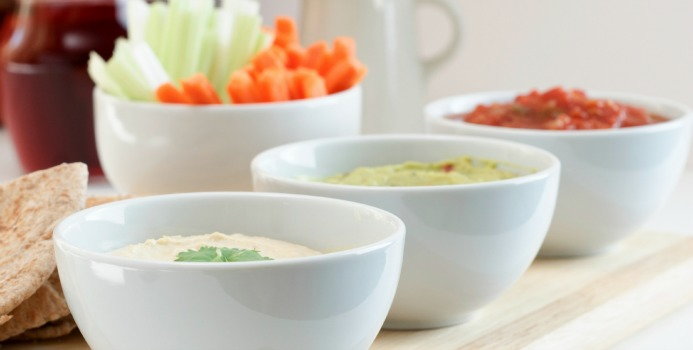Dipping Sauces: How bad are they for you?
Sadly dipping sauces can often account for a huge majority of the calories from a meal. Most store bought or restaurant prepared dips and sauces have a lot of added fat, sugar and other unnecessary ingredients that can add excess calories to your meal. Sauces can often seem like a small part of the meal but when added up they can be the tipping point between exceeding your daily goals or not. Especially if you are frequently eating out or purchasing processed foods.
Ranch Dip:
This dipping sauce tops the list at one of the worst choices. In just 1 ounce of sauce you have 142 calories! This sauce is high in sodium, added fat, and sugar. Ranch dressing/dip can quickly turn a healthy salad or burger into your biggest calorie consumption of the day!
Marinara:
Pasta sauce in general can seem like a healthy choice but be packed full of added sugars and oils. Although some sugar is naturally occurring in the tomatoes- much of store bought pasta sauce contains large amounts of added sugar. Look for labels that say no added sugar. One cup of sauce can have 22g of sugar and the WHO recommends only 25g of sugar per day!
Sweet and Sour Teriyaki Sauce:
This sauce is popular in many Asian food dishes or as marinade for tofu and meat. However this is another key sauce to monitor how much of it you consume. 1 tablespoon has almost 20 calories and many recipes call for many more tablespoons than that per serving. Some meals can have more than a cup of sweet and sour sauce mixed into the vegetables or marinated in the meat. This is ~250 calories from a non-nutritious sauce per meal!
Ketchup:
Ketchup is huge added sugar culprit- even though it doesn’t need to be! The basic premise of ketchup is ripe tomatoes, vinegar, salt, onion powder, garlic and a little bit of sweetener. If you make this dipping sauce at home, it can actually be a nutritious addition to your meal. Purchasing sweet ripe tomatoes can even eliminate the need to add sweetener to your sauce. However store bought choices can quickly add up- high in added sugar, sodium and added fats. Generally one small packet is around 20 calories but who uses just one packet!?
Nut Sauces:
Make sure to use in moderation! Commonly found in Thai restaurants, these sauces are like warmed peanut butter with added sugar, sodium and fat. The calories can quickly add up with ~50 calories per tablespoon. But the nutty flavor combined with healthy proteins and fats can make sauces like peanut, cashew or almond a nice addition to your meal. Make at home with a couple tablespoons of a freshly ground nut butter- add a little Braggs Liquid Amino Acids, garlic, hot sauce and ginger, then stir and warm on low heat. Add a little sweetener if necessary to achieve desired taste.
Barbeque Sauce:
2 tablespoons of BBQ sauce has about 50 calories. Next time you marinate your meats or drizzle it over your plate, actually take out a measuring spoon and see how many you use. Some meals at a restaurant can have more than 6 tablespoons of BBQ sauce per serving. That is 150 calories in just sauce, which is not including the rest of your meal and other dipping sauces.
Healthier Choices
But dips and sauces can really add flavor and do not need to be eliminated from the diet- informed moderation is key! However there are many substitutions, recipes for healthier homemade dips or just generally more nutritious sauce options.
When selecting a recipe or choosing premade dips or sauces or read the label to look at some general rules;
- No added sugar
- Low calories- try to keep your choices under <30 calories/ tbsp
- Low carbohydrates- <5 grams/ tbsp although not strictly representative of added sugar, this can be a good indicator
- Low saturated fat and aim for trans fat free choices- <1 gram/ tbsp
- Low sodium- <70 mg/ tbsp
Healthier options:
- Salsa
- Tahini
- Hummus
- Hot Sauces
- Mustard
- Homemade bean dips
- Homemade Ketchup
- Siracha sauce
- Braggs Liquid Amino Acids (For people looking for low-sodium alternatives to soy sauce)
- Curry Paste
- Garlic Paste
- Ginger Paste
- Wasabi
- Chutney
- Worcestershire sauce
- Greek yogurt dips
- Horseradish sauce
- Edamame dip
Emily DeLacey MS, RD is a Registered Dietitian and currently working in Jamaica as a HIV/ AIDS Prevention Specialist. She attended Central Washington University for her Bachelor's Degree in Science and Dietetics and continued on after her internship to Kent State University for her Master's Degree in Science and Nutrition, with a focus on public health and advocacy. She served as a U.S. Peace Corps Volunteer in Malawi 2012-2014 working as a Community Health Advisor in a rural village, immersing in the joys of life without electricity or running water. She has been to 20+ countries and 47 of the 50 states in the US. Traveling, adventuring and experiencing new cultures has made her a passionate advocate for the equality of nutrition and wellness for all people.



